#bakhmut holds
Text
Bakhmut 800 meters from enemy positions
Cold weather, hard condition of living.But Our Brave Warriors smiling to us
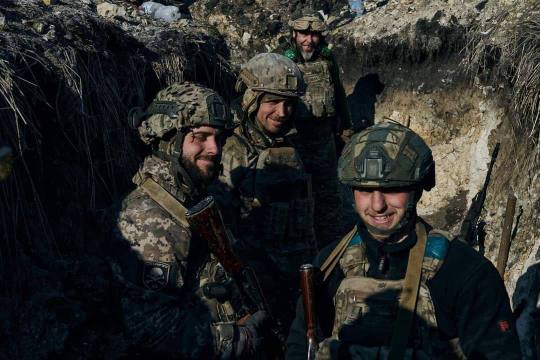
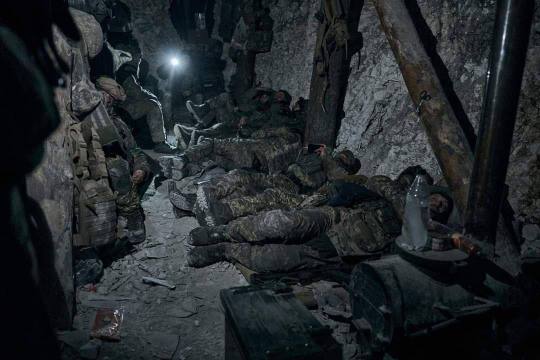

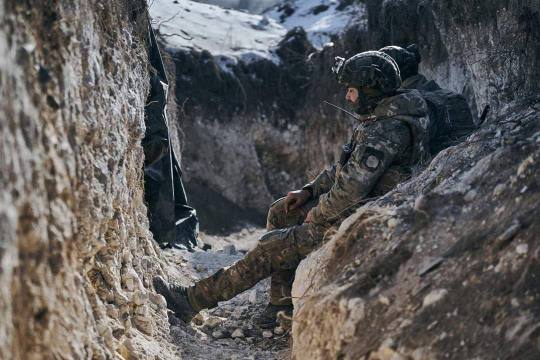
God, please,save our warriors lives
#bakhmut is ukraine#bakhmut holds#ukraine#war in ukraine#ukraine under attack#russia invaded ukraine#russia is a terrorist state#save ukraine#stand with ukraine#stand together#pray for ukraine#pray for ukrainian soldiers#pray for ukrainian armed forces#war#war 2022 2023#ukrainians#unbreakable ukrainians#army#ukrainian armed forces#pet army of ukraine#bakhmut#russia must fall down#fight for motherland#fight for freedom#slava ukraini#glory to the heroes#return alive#pray for ukrainians#ukrainians on tumblr#зсу
92 notes
·
View notes
Text

Maks: What?
Ze: Did. I. Stutter?
Maks: 'heavy sigh'
https://twitter.com/BespalovLive/status/1605203876273160192?t=9Sij1ckfgaCd3hgpHmCJ4A&s=19
#volodymyr zelenskyy#volodymyr zelensky#zelensky#president zelenskyy#zelenskyy#president zelensky#president volodymyr zelenskyy#president of ukraine#his face at .10#Maks is having a drink tonight#Bakhmut holds#Slava Ukraini
4 notes
·
View notes
Video
Bakhmut, Ukraine
Fighting is taking place in Bakhmut 24/7 and despite everything Ukrainian forces still hold the line.
#2022 russian invasion of ukraine#2022 russia-ukraine news#ukraine#russia#bakhmut#assault rifle#the front line#war#world at war#battle#fighting#hold the line
19 notes
·
View notes
Video
youtube
Ukraine Claims It Still Holds Part Of Besieged Bakhmut. #bakhmut #donets...
#youtube#Ukraine Claims It Still Holds Part Of Besieged Bakhmut. bakhmut donetsk ukraine news live eu europe Ukrainian forces still control the sou
0 notes
Text
Ukrainian soldiers prepare to hold the line in Bakhmut
Ukrainian soldiers prepare to hold the line in Bakhmut
Ukrainian troops are preparing to hold the line in eastern Bakhmut using trench warfare tactics reminiscent of World War I. FRANCE 24 speaks with those fortifying positions around the city.
View On WordPress
0 notes
Text

Mykhayl Shulha, center, cries next to the coffin of his sister Sofia Shulha during a funeral prayer in Uman, central Ukraine, Sunday, April 30, 2023. Sofia Shulha, 11, and Kyrylo Pysarev, 17, were killed during a Russian attack on a residential building early Friday morning. (AP Photo/Bernat Armangue)
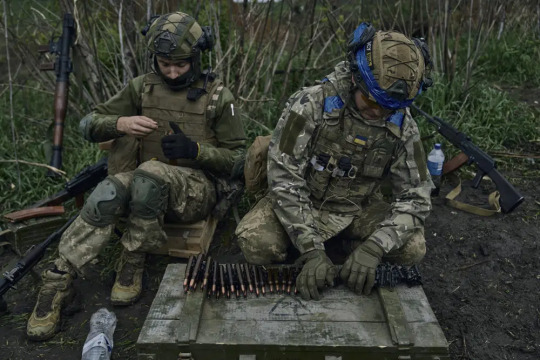
Ukrainian soldiers prepare their ammunition at the frontline positions near Vuhledar, Donetsk region, Ukraine, Monday, May 1, 2023. (AP Photo/Libkos)

An aerial view shows a residential building heavily damaged by a Russian missile in the town of Uman, Cherkasy region, Ukraine, Friday, April 28, 2023. (REUTERS/Yan Dobronosov)

Ukrainian soldiers rest in a shelter at the frontline positions near Vuhledar, Donetsk region, Ukraine, Sunday, April 30, 2023. (AP Photo/Libkos)
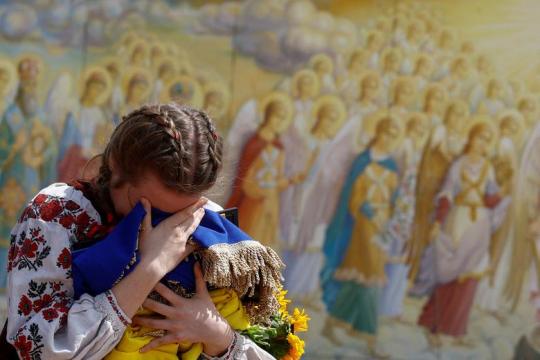
Ivanna Sanina reacts as she holds a Ukrainian national flag and a portrait of her boyfriend Christopher Campbell, U.S. military volunteer of the International Legion for the Defense of Ukraine, who was killed in a fight against Russian troops in the frontline town of Bakhmut, during his funeral in Kyiv, Ukraine, Friday, May 5, 2023. (REUTERS/Valentyn Ogirenko)
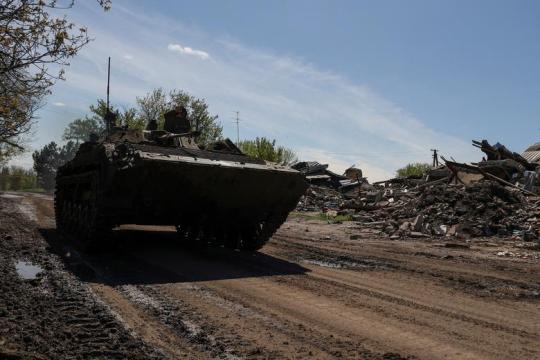
Ukrainian service members ride atop of a BMP-2 armoured fighting vehicle near a front line, amid Russia's attack on Ukraine, in Donetsk region, Ukraine, Wednesday, May 3, 2023. (REUTERS/Sofiia Gatilova)
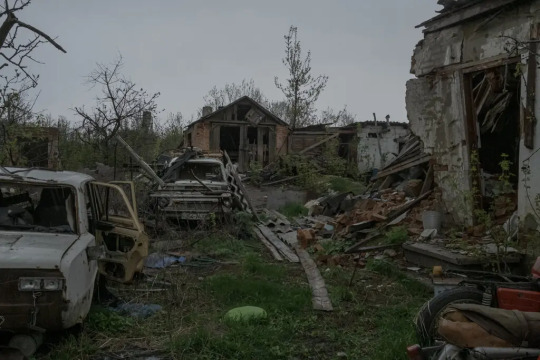
A destroyed home in the small village of Peremoha, in Kharkiv region, in northeast Ukraine, on Saturday, April 22, 2023. (Mauricio Lima/The New York Times)
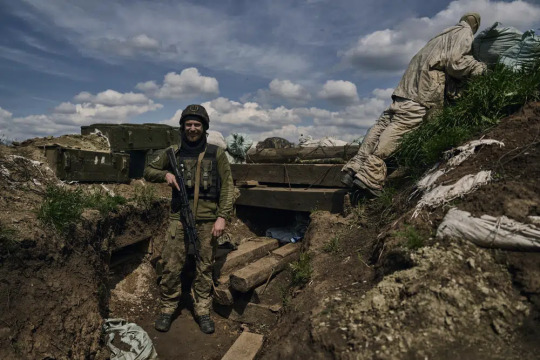
A Ukrainian soldier smiles standing in a trench on the frontline in the village of New York, Donetsk region, Ukraine, Monday, April 24, 2023. (AP Photo/Libkos)

A worker uses a remote control to operate a demining machine, created by local farmer Oleksandr Kryvtsov with his tractor and armoured plates from destroyed Russian military vehicles, in an agricultural field near the village of Hrakove, in Kharkiv region, Ukraine, Tuesday, May 2, 2023. (REUTERS/Vitalii Hnidyi)
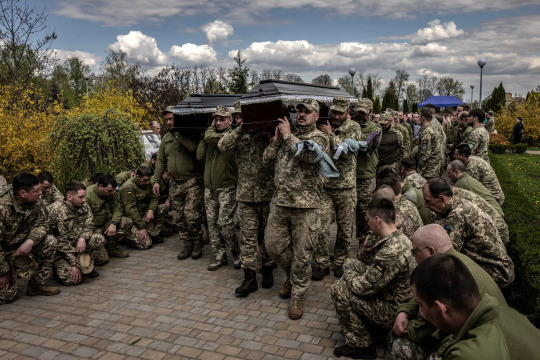
Ukrainian soldiers kneeling as the caskets of their fallen comrades, Vladyslav Posia, 23, and Sergiy Ostapenko, 37, both of whom were killed by shrapnel during fighting in the eastern Donetsk region, are carried during their funerals at Boryspil in the Kyiv region, on Sunday, April 23, 2023. (Finbarr O'Reilly/The New York Times)
246 notes
·
View notes
Text
This is a post of gratitude. Maybe tumblr isn't the most appropriate place for this, maybe it sounds silly and needlessly pretentious coming from a little nobody that I am. Regardless, I have long felt the need to write about it. News about the Leopard tanks from Poland might be a good enough occasion to finally say it.
Dzięki, ačiū, thank you, people of Poland, Lithuania, UK, US and every country that has consistently supported Ukraine since the beginning of the invasion.
Maybe we, Ukrainians, don't say it enough, but we know that we owe our lives not only to our defenders, but to all of you, citizens of countries that didn't abandoned us in these dark times.
Every day on the battlefield my country loses its best men. People who were teachers, doctors, architects and actors, parents, sons and daughters are sacrificing their lives in the name of our survival, our future. Hopefully, with the support of your countries, their sacrifices won't be in vain. Thank you for giving us a chance for the future. Thank you for not leaving us alone in this.
War puts everything into perspective like probably nothing else and it teaches you how to be truly grateful. Only earlier today I wanted to complain that due to the destruction of our infrastructure and emergency power outages, in my apartment it is so cold that I can't even hold the phone in my hands for long - my fingers are freezing. But then I quickly remembered that our fighters in Bakhmut and Soledar are losing their fingers due to the frostbite. I am alive and have a roof over my head thanks to these heroes.
What does this have to do with the topic of this post? Well, the same way I often want to complain about the injustice in this world, I want to write something angry about how russia is not punished enough for the crimes it commits. But then I stop myself, because had the world did not help us throughout these 10 months, had the world just let it slide like it did in 2014, I would likely be homeless, imprisoned or dead, along with millions other Ukrainians. Ukraine could no longer exist by now. Because this is a war of extinction, cultural as much as physical.
Which is why I want to say thank you. Not only for the weapons provided by your countries, but for giving us hope, especially in hard times like these, when the enemy on the eastern front is literally bombarding our troops with cannon fodder in unlimited quantities, turning cities into ruins and meat grinders.
Thank you for helping us to overcome this senseless evil.
This post may be cringy and poorly written, but my gratitude is sincere.
189 notes
·
View notes
Text
Update June 26, 2023
Under the cut:
The Russian warlord Yevgeny Prigozhin has reappeared for the first time since abandoning his armed mutiny on Saturday evening, issuing a defiant 11-minute statement in which he defended the Wagner uprising and said that “society demanded it”. In the statement, Prigozhin denied that Wagner sought to topple Putin and said that the uprising had shown that there were “serious problems with security on the whole territory of our country”.
The US is expected to announce another military aid package to Ukraine totaling approximately $500 million, a US official told CNN.
Ukraine's military intelligence chief accused Russia on Tuesday of "mining" the cooling pond used to keep the reactors cool at the Russian-occupied Zaporizhzhia nuclear plant in Ukraine's south.
EU countries on Monday agreed to increase the maximum size of a fund used to finance military aid for Ukraine by 3.5 billion euros ($3.8 billion) to 12 billion.
Russian intelligence services are investigating whether Western spy agencies played a role in the aborted mutiny by Wagner mercenary fighters on Saturday, the TASS news agency quoted Foreign Minister Sergei Lavrov as saying on Monday.
Frontlines across Ukraine have seen heavy combat over the past two days, with more than 20 engagements occurring in areas in the Donetsk region – chiefly Lyman, Marinka and Bakhmut, according to the Ukrainian military.
The Russian warlord Yevgeny Prigozhin has reappeared for the first time since abandoning his armed mutiny on Saturday evening, issuing a defiant 11-minute statement in which he defended the Wagner uprising and said that “society demanded it”.
In the statement, Prigozhin denied that Wagner sought to topple Putin and said that the uprising had shown that there were “serious problems with security on the whole territory of our country”.
“It was not our goal to overthrow the regime,” Prigozhin said in the voice memo, which was uploaded to his Concord Group’s Telegram page.
“We stopped at that moment, when it became clear that much blood would be spilled,” he continued, describing the progress of a military convoy that reached striking distance of Moscow. “That’s why we believe that the demonstration of what we were planning to do was enough. Our decision to turn back had two factors: we didn’t want to spill Russian blood. Secondly, we marched as a demonstration of our protest.”
He once again accused the Russian defence ministry of targeting his troops with artillery fire, calling it the “trigger for us to move out immediately”.
“The goal of the march was to not allow the destruction of the Wagner private military company and hold to account the officials who through their unprofessional actions have committed a massive number of errors. Society demanded it.”
Prigozhin acknowledged that his troops had killed Russian airmen during their uprising, saying they “regretted that they were required to carry out strikes against aircraft but they were hitting our forces with bombs and rocket strikes”.
He also claimed that the troops movement into Russia was a “masterclass” in how Russia should have carried out its 24 February 2022 invasion of Ukraine, which failed to achieve its goal of taking Kyiv.
-The Guardian
~
The US is expected to announce another military aid package to Ukraine totaling approximately $500 million, a US official told CNN.
The aid, which is expected to be announced on Tuesday, will include additional Bradley and Stryker fighting vehicles, the official said, and will be provided to Ukraine via Presidential Drawdown Authority. Ukraine lost several armored vehicles in the early days of its counteroffensive, which US officials believe Ukrainian forces launched earlier this month.
The package comes as US officials continue to assess what impact the Wagner rebellion inside Russia will have on Russia’s war in Ukraine. US and western officials told CNN last week that the Ukrainian counteroffensive has not been meeting expectations, with Russian lines of defense proving well-fortified. Russian forces have also had success bogging down Ukrainian armor with missile attacks and mines and have been deploying air power more effectively.
The last package, announced earlier this month, was valued at about $325 million and included new air defense and rocket systems for Ukraine.
The US has provided more than $39 billion in security assistance to Ukraine since the beginning of Russia's invasion in February 2022, including $22 billion in presidential drawdowns.
-CNN
~
Ukraine's military intelligence chief accused Russia on Tuesday of "mining" the cooling pond used to keep the reactors cool at the Russian-occupied Zaporizhzhia nuclear plant in Ukraine's south.
The six-reactor complex, Europe's biggest nuclear plant, has been under occupation since shortly after Moscow's forces invaded in February last year.
"...Most terrifying is that the Zaporizhzhia nuclear plant was additionally mined during that time... namely the cooling pond was mined," Kyrylo Budanov, head of the GUR agency, said on television, without providing evidence for his assertion.
Reuters requested comment from the Russian defence ministry.
The two sides have accused each other of shelling the plant and its environs, and international efforts to establish a demilitarised zone around the complex have failed so far.
Ukraine's Defence Ministry, meanwhile, dismissed as "null and void" a Russian suggestion that it could be building a "dirty bomb".
The ministry said the suggestion, made on Monday by Sergei Naryshkin, the head of Russia's SVR foreign intelligence service, was first advanced by Moscow last year.
The move was, a ministry statement said, aimed at "diverting attention from the clear defeats by occupation forces at the front and sowing distrust among Ukraine's Western allies".
"If Russia is talking about a 'dirty bomb', its use by Russia could be a real threat," the ministry said.
Naryshkin had called on the U.N. nuclear watchdog and the European Union to investigate the dispatch of "irradiated fuel" from the Rivne nuclear plant in western Ukraine for disposal at a spent fuel storage facility in Chornobyl.
The U.N.'s International Atomic Energy Agency said it had reported this month on the transfer of spent fuel from Rivne to Chornobyl and taken full account of the material.
-Reuters
~
EU countries on Monday agreed to increase the maximum size of a fund used to finance military aid for Ukraine by 3.5 billion euros ($3.8 billion) to 12 billion.
The European Peace Facility (EPF), which EU countries contribute to according to the size of their economies, has already allocated some 4.6 billion euros in military aid for Ukraine. It is separate from the EU's budget, which is not allowed to finance military operations.
"Today's decision will again ensure that we have the funding to continue delivering concrete military support to our partners' armed forces," the bloc's top diplomat Josep Borrell, who had requested the increase, said in a statement.
"The facility has proven its worth. It has completely changed the way we support our partners on defence. It makes the EU and its partners stronger," he said.
Hungary on Monday said it would not lift a block on a 500 million euro tranche of the existing fund until Kyiv removes Hungarian bank OTP (OTPB.BU) from a list of companies it deems "international sponsors" of Russia's war in Ukraine.
Hungary has branded the bank's inclusion "scandalous".
Foreign Minister Peter Szijjarto, speaking in Luxembourg, said that Budapest was ready to change its mind if Ukraine dropped the blacklisting.
The EPF, established in 2021, was conceived for the EU to help developing countries buy military equipment. But the 27-member union quickly decided to use it also to get weapons to Ukraine after Russia's invasion in February last year.
The fund allows EU countries that supply weapons and ammunition to Ukraine and claim back a portion of the cost.
-Reuters
~
Russian intelligence services are investigating whether Western spy agencies played a role in the aborted mutiny by Wagner mercenary fighters on Saturday, the TASS news agency quoted Foreign Minister Sergei Lavrov as saying on Monday.
In an interview with Russian RT television, Lavrov said U.S. Ambassador Lynne Tracy had spoken to Russian representatives on Sunday and given "signals" that the United States was not involved in the mutiny and that Washington hoped that Russia's nuclear arsenal would be kept safe, TASS said.
Lavrov also quoted Tracy as saying the mutiny was Russia's internal affair.
Several Western leaders have said the incident shows that instability is growing in Russia as a result of President Vladimir Putin's decision to send his armed forces into Ukraine early last year.
Asked whether there was any evidence that neither Ukrainian nor Western intelligence services were involved in the mutiny, Lavrov replied:
"I work in a department that does not collect evidence about illegal actions, but we have such structures, and I assure you, they already understand this."
Doubts over Wagner's future have raised questions about whether it will continue its operations in African countries such as Mali and the Central African Republic, where its forces have played a big role in long-running internal conflicts.
Since the war in Ukraine undermined Russia's ties and trade with the West, the Kremlin has also been underlining its commitment to Africa.
Lavrov told RT that Mali and CAR both maintained official contacts with Moscow alongside their relations with Wagner, adding: "Several hundred servicemen are working in the CAR as instructors; this work, of course, will be continued".
A presidential advisor for CAR's president told Reuters on Monday that nothing had changed since the weekend events in Russia.
Fidele Gouandjika said Wagner was not officially established in the country, and that the military cooperation agreement they signed was with the Russian Federation, which deploys contingents of its choice.
"The first one (is) made of Russian instructors to train our security forces … the second contingent are soldiers that the West calls Wagner," he said.
"Russia sent us Wagner but we signed with Russia and so if they sent us private militias that's their choice. We keep working with the soldiers that Russia sent," he said.
Lavrov also said Ukrainian allegations that Russia plans to stage an attack involving a release of radiation at the Zaporizhzhia nuclear plant in southern Ukraine were "nonsense", TASS reported.
-Reuters
~
Frontlines across Ukraine have seen heavy combat over the past two days, with more than 20 engagements occurring in areas in the Donetsk region – chiefly Lyman, Marinka and Bakhmut, according to the Ukrainian military.
In its operational update, the General Staff said the Russians also carried out 25 air strikes over the past day.
There had been heavy Russian artillery and mortar fire in the Kupyansk area of Kharkiv, where the Russians have been trying to break through for over a month, the Ukrainians said.
The General Staff insisted all Russian efforts to take territory had been foiled. Across the Donetsk frontlines, the fighting was characterized by exchanges of indirect fire, but with little movement.
However, the Ukrainians say they are on the front foot around Bakhmut.
“(Troops) hold the initiative, continue assault operations and push the enemy back. Over the last day, the Ukrainian forces advanced 600 to 1,000 meters on the southern and northern flanks around Bakhmut,” said Serhii Cherevatyi, spokesperson for the Eastern Grouping of the Armed Forces.
Nearly 200 Russian soldiers had been killed in the last day, and a variety of Russian equipment had been destroyed, according to Cherevatyi.
CNN cannot verify Ukrainian claims of battlefield gains, or casualties.
In the south, where Ukrainian forces have attempted to break through Russian lines, the General Staff said a Russian effort to regain lost positions in the area of Novodarivka had also failed.
Russian artillery continued to strike about 30 settlements along the frontlines in the Zaporizhzhia region, it said.
In Kherson, Nataliya Humenyuk, a spokesperson for Ukrainian forces in the south, said the Russians struggled to regain positions on the east bank of the river Dnipro, which was flooded by the recent damage to the dam at Nova Kakhovka.
“Their work is complicated by the spread of intestinal infections,” Humenyuk said.
-CNN
#daily update#ukraine#russia#war in ukraine#bakhmut#wagner group#EU#US#zaporizhzhia#zaporizhzhia nuclear power plant
57 notes
·
View notes
Text
L'Express: Olena Zelenska, First Lady of Ukraine: "Don't forget us!"
The wife of President Volodymyr Zelensky reminds us that the Russian-led war is still raging throughout her country.

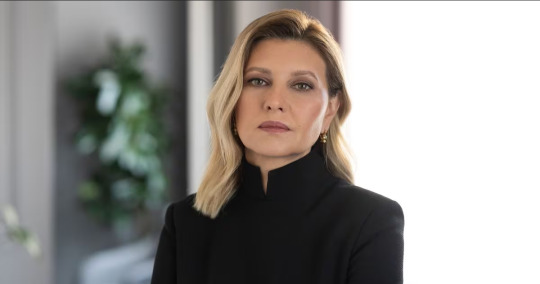
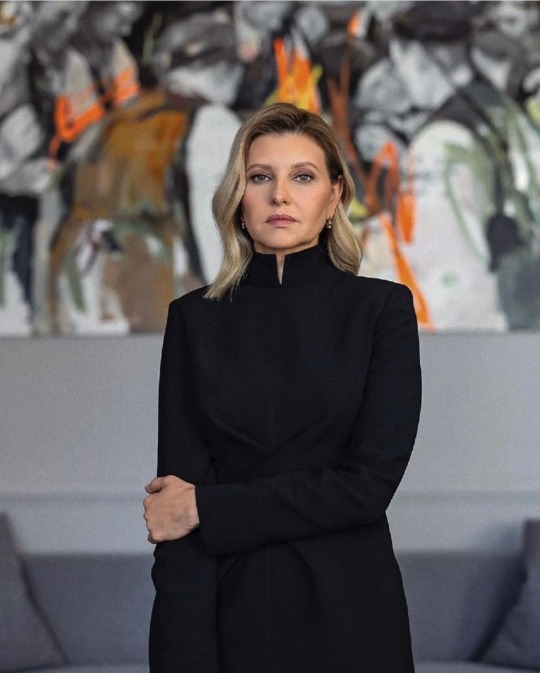
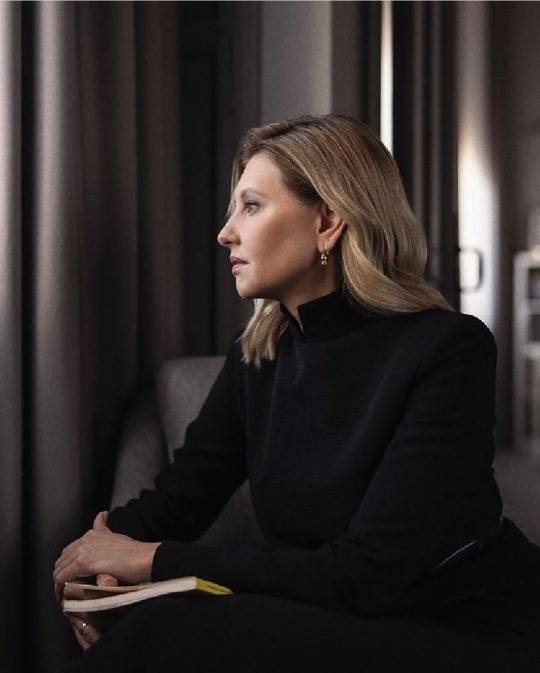
Propos recueillis par Eric Chol et Charles Haquet
Publié le 08/11/2023 à 10:57
She doesn't dress in khaki like her husband, Volodymyr Zelensky, but she too is on the front line defending her country. On November 8 and 9, Olena Zelenska is in Paris to inaugurate a Ukrainian cultural institute and raise funds for her humanitarian foundation. While the world's attention is focused on the Israeli-Palestinian war, and the Middle East is on the brink of explosion, the First Lady sends this powerful message to L'Express: "Don't forget Ukraine!" And let's not turn away from the soldiers fighting in the trenches of Bakhmut and Robotyne. Because their freedom is our freedom too. And Vladimir Putin will not stop at the borders of the former Soviet Republic. "The nature of an empire is to expand," she stresses. "It only stops if you stop it."
As one war drives out another, the mistake would be to consider that we cannot hold two fronts at the same time. And to admit that opinions "only have room in their intelligence and emotion for one conflict", in the words of philosopher Bernard-Henri Levy, co-author of a remarkable film on the Russian-Ukrainian conflict.
In Washington, the most radical Republicans, unconvinced by the Ukrainian counter-offensive, want to dissociate the aid given to Israel and Kiev. All the better to torpedo the latter. As US President Joe Biden says, Hamas and the Kremlin share the same goal: "to annihilate a neighboring democracy". Who, then, to favor? In reality, our only option is not to choose.
L'Express: Almost two years of war in Ukraine, a frozen front, a Russian army stepping up its bombing: how are the Ukrainians doing?
Olena Zelenska: It's a very difficult life. You'd think we'd get used to this stress, this constant upheaval, but that's not possible! A month ago, we experienced a great tragedy with the bombing of Hroza, in the Kharkiv region, where a Russian missile killed almost a third of the village's inhabitants. Imagine a funeral in every house… To top it all off, these people were gathered to attend a funeral, so it's the deaths that lead to other deaths, individual deaths, collective deaths. On October 21, the whole of Ukraine was shaken by the destruction of a postal sorting center in Kharkiv. Six employees working in the depot were killed. Some people abroad, and even here at home, sometimes imagine that there is a part of Ukraine where there is no war, where life is in full swing, where everything is going well. But this is not true! Because no matter where you are in the country, you can never be sure of being safe, of waking up the next day, of being able to go to work… The forecast horizon for Ukrainians has become very short. But we must continue to live, to develop, to rebuild, to raise our children. We must learn to plan each day, to adopt strategies, even if they may not be implemented. To my mind, it's a way of life, with the hope of victory on one side, which will come quickly, and on the other the constant trials that bring us down, but from which we have to get up every time.
As a frequent traveler in Ukraine, what is the story that has struck you most in recent weeks?
To tell the truth, I'd like to travel more in my country to meet the people who have suffered the most, but unfortunately this isn't always possible. Every discussion with my compatriots leaves a new imprint on my emotions. Let me tell you what has always impressed me. As part of my foundation's work, I meet regularly with foster families who take in children, most of them orphans, and these families are often made up of internally displaced people. They have fled occupied, bombed-out regions to settle in other parts of Ukraine. Unfortunately, in most cases, this is not the first time these families have fled: back in 2014, they had to leave the Donetsk region. Today, they have to leave their homes once again. Imagine their emotions! We're dealing with families who are constantly forced to flee the war, but it keeps catching up with them. To tell you the truth, I can't imagine how anyone can survive in this situation, how anyone can live when they're being chased by war. Because it's not a tsunami or a forest fire that forces them to leave: those who target them are people who come to kill, and that's what's so frightening!
Since the Hamas attack on Israel on October 7, all eyes have been on the Middle East. Do you fear that the world is turning its attention away from Ukraine?
First of all, I'd like to say that, like everyone else, we feel very strongly about what's happening in Israel, and we share the suffering of the Israeli people. We watched this terrorist attack by Hamas with great horror, but without surprise. It proves once again what we have been saying since the beginning of the war: if aggression is not stopped, it will continue in different forms and in different parts of the world. But we are not protected by the arrival of another tragedy, and that doesn't mean that the one in Ukraine has gone away. In fact, this war in the Middle East is only making the current tragic situation worse.
It is precisely for this reason that we hope the world will see how reacting slowly to tragedy only reinforces the desire of other aggressors to act. Impunity gives carte blanche! Particularly to those who have forces lined up behind them, enough financial and military resources around the world, and who feel that the time has come to act as they please, because they can. Unfortunately, this is the truth, which is why it's important to react quickly to all these aggressions, and not to each one separately, because they're all linked.
What is your message on this subject to the West, and in particular to France, where you have just arrived?
As I just said, it's vital not to let the world's attention wander away from Ukraine. We are already seeing that military aid to our country is arriving too slowly to bring about positive change on the front line. It's too slow, too quiet. It seems that Europe remains placid, and doesn't seem too frightened by the prospect of Russia's borders closing in on it. Yet this prospect is very real! Let's think about what would happen if Ukraine hadn't held out. In our place would be Russia, and hundreds of kilometers closer to you, to your homes. I wouldn't want other people in Europe, other mothers in Europe, to be afraid, not just of the possibility of Russian attacks, but of the physical sensation of that danger. Today, we are the barrier against this Russian advance. As long as we hold out, there's a chance they won't advance. But the empire won't stop if we don't stop it. Its nature is such that it must constantly expand. Otherwise, it ceases to be an empire! It's always looking to expand, and today, it's on our account. That's why we keep repeating that Ukraine defends the interests of the whole of Europe. Let's not forget that, and let's do things together!
You speak of a Europe that is too calm. How can we make sure it doesn't forget Ukraine?
We mustn't let it fall asleep! We often see this scene in the movies, of a person who's too cold, starts to freeze and falls asleep. If you don't want that person to die, you have to prevent them from falling asleep. I think the current situation is comparable: this sleep is dangerous for Europe. We can't fall asleep, we can't let Europe close its eyes today. I very much hope that my visit to France will serve as a reminder that the danger is still there. It is hanging over us now, and if we do nothing, it will unfortunately fall on your heads. I hope we can stop it.
During a recent visit to Washington, you said that the Russians wanted to destroy Ukrainian culture. As we know, war is fought in the trenches, but also on the cultural front. What can be done to counter the Russian narrative?
For a long time, Ukrainian artists and our country's cultural values and wealth were considered Russian by the rest of the world. Belonging to the Russian empire automatically made an artist Russian, which is not true. Today, our aim is to restore the place of this cultural heritage and tell the world what it really represents. I imagine that most French people don't always understand the boundary between Russian and Ukrainian. Many Ukrainian works around the world are still considered Russian. Take, for example, the dancers by French painter Edgar Degas. For many years, a painting was titled Russian Dancers. It was only recently that the National Gallery in London, then the Metropolitan Museum of Art in the USA, renamed it Ukrainian Dancers. The girls depicted are indeed groups of dancers in Ukrainian dress.
It's an example of the cultural battle we have to wage, even though we clearly don't have the means to devote so much money or administrative effort to beating Russian propaganda. We just can't. But we have to start disseminating more information about Ukraine in order to push back Russian lies. That's why I'm taking part in the inauguration of the Ukrainian Institute in Paris on November 9. This institute, the second to be opened abroad after Berlin a few months ago, is taking up residence at the Gaîté Lyrique in the heart of Paris. Its mission will be to disseminate knowledge about Ukraine and promote our culture throughout the world. Obviously, this work cannot be carried out solely from Ukraine - that would be too difficult. This is why this Parisian institute will be able to host artists' residencies and provide them with support, with the aim of creating cultural encounters and cross-cultural events, and strengthening cooperation with French cultural and scientific institutions. This will strengthen our ties and ensure that Russian stories are transformed and become Ukrainian stories.
Destroying Ukrainian culture also means stealing its future, in other words, its children. Several thousand of them have been deported to Russia: how can we get them back?
More than 19,600 Ukrainian children have been taken to Russia, according to our social services. It's a tragedy. I'm thinking in particular of this father from Marioupol, imprisoned by the Russians, whose three children were kidnapped. When he was released, he looked for them everywhere, he was desperate. Until one day, his son called him. He was in Russia and told him he was going to be adopted.
The longer the children stay in Russia, the deeper the psychological impact. The 380 children we were able to bring back to Ukraine all tell of the same ordeal. When they arrive in Russia, they are subjected to a patriotic education. They must learn to love their new homeland. To do this, they must be convinced that they have been abandoned and that no one is looking for them. It's real mental torture.
Unfortunately, there is no official way of getting them back. The Russians don't want to hear about it, they won't answer our questions. Our only recourse is action by the international community. At the last UN General Assembly, I proposed the creation of a mechanism that would at least enable us to establish a dialogue with the Russians, via a third country for example. For us, it's a question of making sure that these children are all right and that they can return home. As soon as possible.
You're very committed to the subject of mental health. What is the psychological state of Ukrainians after more than six hundred days of war?
Ukrainians are suffering from two types of illness. Firstly, there are those who feel fear, uncertainty and the inability to plan ahead. They have loved ones at the front who could be killed every day and every night. It's a constant source of anxiety. Our all-Ukrainian mental health program is working on this, with an emphasis on education. People need to understand what they're suffering from and know that they can be treated. Then, we need to deploy services that enable them to quickly get in touch with specialists, close to their home or workplace, free of charge.
And then there are the victims of post-traumatic syndromes - both military and civilian. They all benefit from adapted programs, including children, who are not always able to ask for help. We need to raise awareness among parents, who are sometimes reluctant to alert the relevant services. For example, the manager of a new rehabilitation program for traumatized children told me that their parents refused to let them go to a therapeutic camp, because they didn't understand how it could help them. We need to break this taboo.
Speaking of children, how are yours coping with this situation? What words do you use to reassure them? And how do they see the future?
The worst thing for us is not being able to make plans. We live from day to day, hoping for tomorrow. I have two children. My eldest daughter is 19, so she can already be considered an adult. She's at university. Half the courses are online, but she goes there from time to time, which is very good for her socialization. It allows her to make plans for the week ahead, it gives her a rhythm to her life and forces her to move forward. My youngest son is 10, and can go to school because the school has an air-raid shelter. This means he can attend certain classes face-to-face, have friends and communicate with them. It's a real blessing.
But when my children ask me, "When will we go to the seaside on vacation?", I can only reply, "Not now, but let's think together about what we'll do after the victory." This way of putting off all pleasant things until later, of not being able to give a date, obviously limits children in their dreams, in their projects. And it's the same for all the country's children. Youth is a time of dreams, and dreams should know no boundaries. Unfortunately, our children's dreams have limits, and these cannot be exceeded.
In 2022, you set up a foundation dedicated to humanitarian aid, health and education. What are the first results?
A positive one. In Izium, we are restoring the hospital, half of which had been destroyed and looted by the Russians. We have started work on the most critical unit, the four operating rooms. We now need to continue its reconstruction. Another priority is helping large adoptive families. Many of them are displaced persons who no longer have a home, and it is very difficult to find them a new one. Our project will enable us to build 14 apartment blocks for these families. The first residences will be available in December, the others in the spring. After that, we hope to build more. The need is great: at least 80 large adoptive families have lost their homes because of the war.
Secondly, we are trying to support our education system in the regions near the front. Our children and teachers need resources such as tablets and laptops. It's difficult to get materials to them because of the security situation. Last month, a Russian missile hit a school in Nikopol, southwest of Dnipro. The buildings were destroyed. We thought the laptops, donated by the United Arab Emirates, were lost. But when we cleared away the rubble, we realized that they were intact. We were able to deliver the laptops to the students, so that they could prepare to enter university and continue their studies. In one year, the foundation handed out almost 50,000 devices to children and teachers. Access to education, even in wartime, is a key issue.
And then there's the problem of bombing. In Ukraine, one school in seven can no longer accommodate children because it has no air-raid shelter to protect them in the event of an air raid. We are therefore building shelters in six schools and one kindergarten in the Chernihiv, Poltava, Dnipro and Kirovograd regions, and we plan to implement similar projects in other parts of Ukraine.
Finally, there's humanitarian aid. We are helping those most affected, especially those living in the Kharkiv and Kherson regions. When the Russians targeted our energy system last year, we supplied these people with dozens of electric generators. People were living in half-destroyed houses, with no heating, no electricity. They were suffering. We helped them heat their homes and provided them with basic necessities. We're preparing to do the same thing this year, because unfortunately there's no hope of Russia abandoning its destructive plans against our energy system.
How has the war changed you and your husband?
I feel as if the year and a half we've just lived through counts as ten years… It's been an extremely emotionally draining time. I hope that this ordeal won't change us forever, and that it won't prevent us from looking to the future with optimism.
Afterwards, knowing how I've changed, how my husband has changed… I think we'll be able to answer that question in several years' time, when we'll be able to take a cold look at all this madness. For the moment, it's not possible.
Article
#olena zelenska#olena selenska#ze interview#olena interview#russia#ukraine#war#translated interview#interview 2023#2023#lexpress interview#lexpress#zelenska
23 notes
·
View notes
Text
Bakhmut



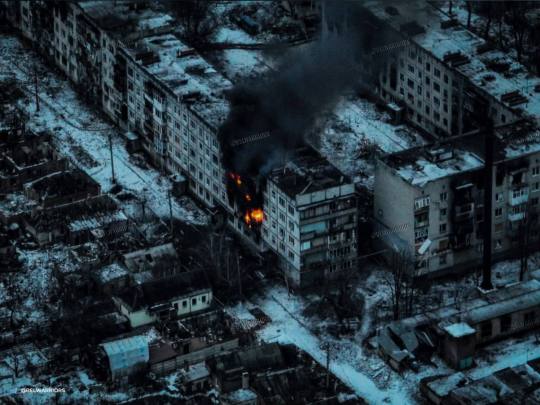
#battlefield#bakhmut#ukraine#war in ukraine#war 2023#russia invades ukraine#pray for ukraine#ukraine under attack#war#pray for ukrainians#pray for ukrainian armed forces#bakhmut holds#bakhmut is ukraine#ukrainians on tumblr#stand with ukraine#arm ukraine now#pray for ukrainian soldiers#ukrainians#фортеця бахмут#бахмут#україна#russia is a terrorist state#russian invasion
78 notes
·
View notes
Text
Russian troops have occupied the eastern Ukrainian town of Avdiivka after a months-long assault that wore down Ukrainian troops running low on ammunition.
It's Russia's first major battlefield win since last May and a boost for Russian President Vladimir Putin ahead of next month's presidential elections.
Ukraine's newly appointed military chief, Gen. Oleksandr Syrsky, said in a statement that he decided to withdraw units from the embattled town to "avoid encirclement [by Russian troops] and preserve the lives and health of servicemen."
President Biden acknowledged the significance of Avdiivka's fall in a call to Ukraine's president Volodymyr Zelenskyy on Saturday. A readout of the call from the White House said Ukraine's military "was forced to withdraw from Avdiivka after Ukrainian soldiers had to ration ammunition due to dwindling supplies as a result of congressional inaction, resulting in Russia's first notable gains in months."
Speaking at the Munich Security Conference in Germany, Zelenskyy said the withdrawal was "a correct decision" and that Russia achieved very little other than depleting its army by losing "thousands of soldiers." But he told Ukraine's Western allies that holding up military aid, especially artillery and "long-range capabilities, allows Putin to adapt to the current intensity of the war."
"We're just waiting for weapons that we're short of," he said. "Our weapon today is our soldiers, our people."
Avdiivka, known for its large plant that produces a coal-based fuel called coke, has been resisting Russian assaults since 2014, when Russian proxies occupied parts of the eastern Donetsk region. Last October, Russian troops turned up their attacks following the takeover of another city in the region, Bakhmut. The Russian assault drove out most of Avdiivka's 30,000 residents. A few hundred remain, hiding in basements.
6 notes
·
View notes
Text

🇷🇺🇺🇦 🚨 UPDATE ON THE RUSSO-UKRAINIAN WAR, OVERNIGHT ON DAY 619 INTO DAY 620
On the Political front:
President Zelensky is facing intense pressure from Ukraine's Western sponsors to hold elections next year, during which time it is apparent that the Western leaders supporting Ukraine will push for new leadership, with the hope of negotiating a ceasefire with the Russians in order to restock and reconstitute the Ukrainian Armed Forces before persisting with any further offensive operations in the East of Ukraine.
However, Lavrov, Peskov and Putin have all clearly stated that a ceasefire is NOT on the table, and any negotiated settlement agreed to by the Russians will require Ukrainian and Western acknowledgement that the regions of Ukraine taken by Russian Forces are now a constitutional part of the Russian Federation and acknowledgement of this by Ukraine and its allies will be a non-negotiable part of any political settlement.
It is unclear whether Ukraine, the United States or Ukraine's European allies understand how firm Russian officials are in this pledge, as they only seem to negotiate amongst themselves without including representatives of the Russian Federation.
In the Kherson direction:
In the area of Baryslav, Russian Forces were using FPV drones to disable a power station relay.
Meanwhile, heavy fighting is occuring in the area of the two Ukrainian footholds on the Left bank of the Dnieper, however with video evidence lacking, it is unclear what kind of operations are underway, and who is launching them.
In the Zaporizhzhia direction:
By Verbove, in the fields between Verbove and Robotyne, Ukrainian Forces of the 82nd Air Mobile Brigade were using FPV drones for bombing and striking Russian Forces after they managed to expand their zone of control in recent days, with Ukrainian video evidence showing Russian Forces occupying further trenches west of Verbove, retaking full control of the trench network here that had been under Ukrainian control just days before.
Russian Forces were heavily bombing and shelling Ukrainian positions to the northwest of Verbove, to the southwest of Verbove, and to the west of Novopokrovka, north of Verbove, destroying significant numbers of Ukrainian manpower and equipment in this area, including armored personnel carriers and fortified positions of the Armed Forces of Ukraine. The heavy bombing is likely in preparation for further offensive operations west of Novopokrovka.
In the Avdiivka area:
North of Avdiivka, in the fields to the east of Stepove, Russian Forces destroyed an abandoned Leopard MBT belonging to the Armed Forces of Ukraine in a Lancet drone strike.
In the area of the rail lines northeast of Stepove, Ukrainian Forces using FPV drones were targeting Russian forward positions following the rail lines where the Russians recently expanded their zone of control. Video evidence from the Ukrainian drone strikes confirms the development of this territory for the Russian Forces in the region, who are pushing from the rail lines in the northwest direction of Ocheretyne.
In the Bakhmut area:
Russian Forces in this area were using FPV drones on the Ukrainian fortified positions north of Kurdiumivka and Zelenopillia to Andriivka, destroying significant accumulations of manpower here.
Meanwhile, Russian Recognizance Forces managed to cross the rail lines south of Bakhmut to develop an ambush for a Ukrainian sabotage unit just north of Andriivka, and as result of this ambush, the Ukrainian unit was destroyed.
Southwest of Klischiivka, Russian Forces launched a series of bombing raids on Ukrainian tanks, armored vehicles and artillery in this area, with multiple significant hits.
In the Lymanske/Kupiansk direction:
In the fields to the northwest of Yahidne, video footage released by the Ukrainian side shows Russian operations from recent days, confirming that Russian Forces in this area managed to expand their zone of control west and northwest of the village of Yahidne, landing infantry troops in this area using various armored personnel carrierswith tanks as back up under heavy fire from Ukrainian Forces.
However, even in these regions where Ukrainian Forces still have ammunition for howitzers, HIMARS, self-propelled guns, and mortars, you still see a notable lessening of the intensity of Ukrainian strikes and a heavy reliance on commercial FPV drones rather than traditional artillery. Hence, Russian Forces are gradually and progressively developing their positions along nearly the entire frontline, but in particular in the Zaporizhzhia, Vremivka tactical salient, Bakhmut and Kupiansk directions.
@WorkerSolidarityNews
#russo ukrainian war#ukraine#russia#russia news#ukraine news#ukraine war#special military operation#SMO#russia ukraine war#eurasia#eastern europe#news#politics#geopolitics#war news#world news#international news#international affairs#global news#breaking news#current events#war update#update#geopolitics news#us news#war#WorkerSolidarityNews#ukraine update#wars#proxy war
8 notes
·
View notes
Text
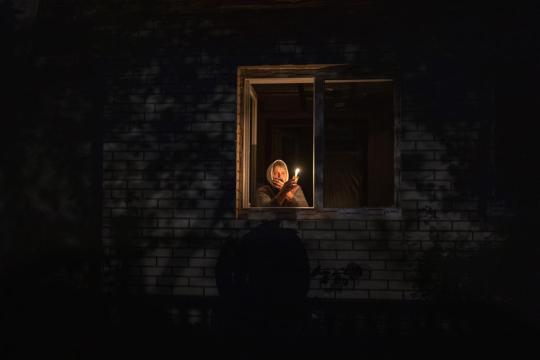
Catherine, 70, looks out the window while holding a candle for light inside her house during a power outage, in Borodyanka, Kyiv region, Ukraine, Thursday, October 20, 2022. Airstrikes cut power and water supplies to hundreds of thousands of Ukrainians on Tuesday, part of what the country's president called an expanding Russian campaign to drive the nation into the cold and dark and make peace talks impossible. (AP Photo/Emilio Morenatti)
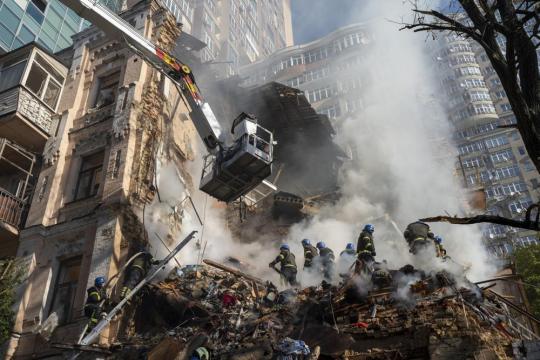
Firefighters work after a drone attack on buildings in Kyiv, Ukraine, Monday, October 17, 2022. Waves of explosive-laden suicide drones struck Ukraine's capital as families were preparing to start their week early Monday, the blasts echoing across Kyiv, setting buildings ablaze and sending people scurrying to shelters. (AP Photo/Roman Hrytsyna)
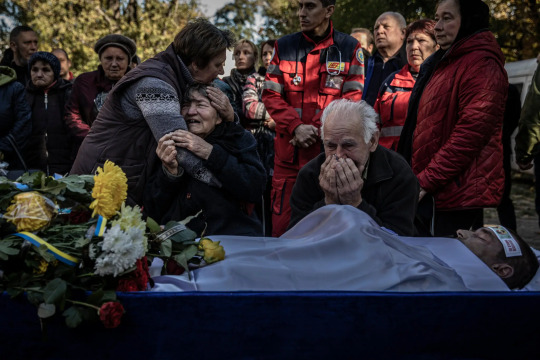
Mourning in eastern Ukraine on Tuesday, October 18, 2022 at the funeral of a 42-year-old Ukrainian soldier who was killed by shrapnel during fighting. (Finbarr O'Reilly/The New York Times)

Two woman stand next to Ukrainian flags placed in memory of civilians killed during the war at the Independence square in central Kyiv, Thursday, October 20, 2022. (AP Photo/Francisco Seco)
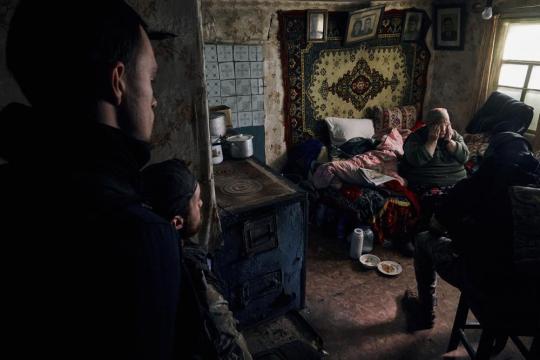
Volunteers urge a local elderly woman to leave her house located in a combat zone in the village of Zarechne, Donetsk region, Monday, October 17, 2022. (AP Photo/LIBKOS)

Damaged ambulances in Bakhmut, in Ukraine’s eastern Donetsk region, on Wednesday, October 19, 2022. The area has faced relentless shelling from Russian forces. (Finbarr O'Reilly/The New York Times)
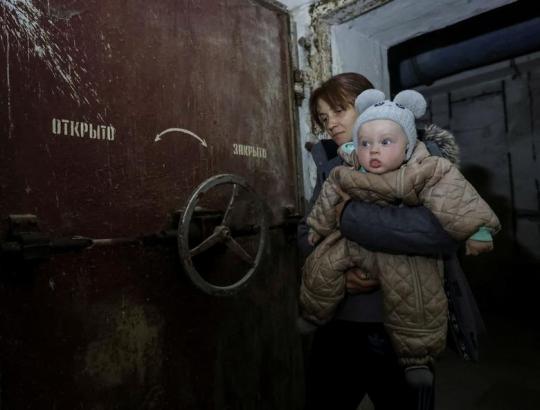
Zhenia, 6-months-old and his mother, Olha Shevchenko, 39, in a bomb shelter in Kharkiv, Ukraine, Thursday, October 13, 2022. Zhenia has lived in a bomb shelter since he was born. (REUTERS/Vyacheslav Madiyevskyy)

Crews working to extinguish fires and search for missing people on Monday, October 10, 2022 after a missile hit a residential building in Zaporizhzhia, Ukraine. (Nicole Tung/The New York Times)

People shop in a supermarket as Kharkiv suffers an electricity outage in Kharkiv, Ukraine, Monday, October 17, 2022. (REUTERS/Clodagh Kilcoyne)
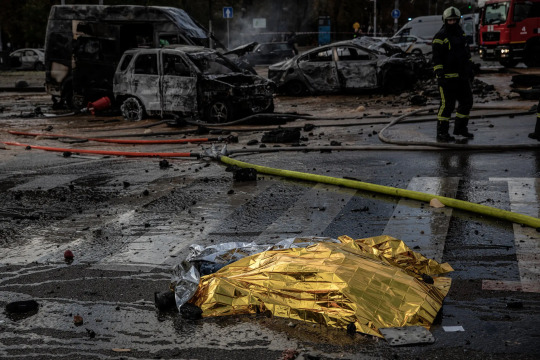
A body lay covered in foil after a Russian strike in Kyiv on Monday, October 10, 2022. In Russia’s largest aerial assault since the early days of the war, missiles rained on at least 11 cities across Ukraine. President Vladimir Putin of Russia said the strike was retaliation for an explosion that destroyed sections of a bridge linking Russia to the Crimean Peninsula on October 8. (Finbarr O'Reilly/The New York Times)
370 notes
·
View notes
Text
in a much less amusing note,
if you don't follow the news:
Bakhmut is still holding out, which I cannot emphasize how fucking impossible of a feat that is rn.
Russians are filming themselves committing war crimes again. the most recent is a video of some soldiers shooting an unarmed POW. very bold of them tbh, especially considering how quickly those responsible for Bucha were identified and hunted down.
F in the chat for Japan's Aerospace Exploration Agency. we've all taken Ls recently but bro that suuuuucks.
some Americans were kidnapped recently after crossing the border into Mexico. the good news is that two of them have been found. bad news is that those two are dead, as well as a local Mexican woman.
There is SOMETHING going on in Israel regarding a government judicial reform but I'm not informed enough to explain what it is.
Kilicdaroglu has been nominated to run as the opposition candidate to Erdogan come the spring election. I have no idea who this man is but we will watch your career with great interest.
not a ton of activity but it's all sorta depressing nonetheless.
20 notes
·
View notes
Text
Daily Wrap Up March 21, 2023
Under the cut:
A Ukrainian army major in the Bakhmut area says the situation remains extremely difficult, but that he believes the Russians are losing their "offensive potential."
The U.K. Minister of State for Defense Annabel Goldie said on March 20 that some of the ammunition her country would deliver to Ukraine alongside Challenger 2 tanks contains depleted uranium. “Such rounds are highly effective in defeating modern tanks and armored vehicles,” Goldie added. The U.K. pledged to supply Ukraine with 28 Challenger 2 main battle tanks as part of the Western allies’ assistance package. Multiple countries promised to send dozens of German-made Leopard 2 tanks, and the U.S. promised to send 31 Abrams tanks later this year.
Chinese president, Xi Jinping, and Russian leader, Vladimir Putin, have finished formal talks at the Kremlin, and are signing documents on strategic cooperation, Russian state media are reporting. The pair signed a joint statement “deepening the two countries’ comprehensive strategic partnership of coordination for the new era”, Hua Chunying, a spokesperson for the Chinese foreign affairs ministry, said.
The US has changed course and is now providing Ukraine with 31 M1-A1 Abrams tanks instead of the newer M1-A2 variants previously planned, Pentagon spokesperson Brig. Gen. Patrick Ryder said Tuesday. This will allow for the tanks to get there faster.
Patriot missile defense systems are set to be deployed to Ukraine faster than originally planned, and a group of 65 Ukrainian soldiers will complete their training on the systems at Fort Sill, Oklahoma, in the coming days, US defense officials said on Tuesday.
Xi Jinping and Vladimir Putin emerged from two days of talks on Tuesday with warm words of friendship between China and Russia and joint criticism of the West, but no sign of a diplomatic breakthrough over Ukraine.
“A Ukrainian army major in the Bakhmut area says the situation remains extremely difficult, but that he believes the Russians are losing their "offensive potential."
Maksym Zhorin said on his Telegram channel that "the main task for the Ukrainian army is to hold the connection corridor, which allows for the supply and evacuation of the wounded."
"Therefore the fighting around this corridor, in the area of Ivankivske and Bohdanivka, is the most difficult," he said.
The two villages sit on routes west from Bakhmut toward the city of Kostiantynivka.
"One thing I can say for sure is that the enemy is gradually running out of offensive potential," Zhorin said. "They have sustained significant losses while trying to advance in the South and in the North, as well as while trying to attack directly through urban areas. Nevertheless, the endless assault attempts continue."
"The Russians have a goal to take Bakhmut at any cost. We have orders to hold the line. We are following our orders."”-via CNN
~
“The U.K. Minister of State for Defense Annabel Goldie said on March 20 that some of the ammunition her country would deliver to Ukraine alongside Challenger 2 tanks contains depleted uranium.
“Such rounds are highly effective in defeating modern tanks and armored vehicles,” Goldie added.
The U.K. pledged to supply Ukraine with 28 Challenger 2 main battle tanks as part of the Western allies’ assistance package. Multiple countries promised to send dozens of German-made Leopard 2 tanks, and the U.S. promised to send 31 Abrams tanks later this year.
U.K. Defense Secretary Ben Wallace said in an interview with Reuters on Feb. 22 that Challenger tanks could start to arrive in Ukraine in the spring.
Depleted uranium is a dense metal formed as a byproduct of enriching natural uranium for nuclear fuel. Being still radioactive but at a much lower level than the original material, depleted uranium is used in armor-piercing projectiles and bombs for greater penetration power.
According to the U.S. Environmental Protection Agency, depleted uranium can seriously threaten human health if its particles are ingested or inhaled. Munitions containing depleted uranium were used in both Gulf Wars, Serbia, and Kosovo.
Many studies on depleted uranium report no evidence of danger, but their results remain controversial, the Scientific Committee on Health and Environmental Risks of the European Commission wrote.
On March 21, Russian dictator Vladimir Putin condemned the U.K.’s plans to send ammunition containing depleted uranium to Ukraine, saying Moscow “would have to respond accordingly,” as quoted by Reuters.
Russia has made a series of nuclear threats since the beginning of its full-scale invasion of Ukraine.
The Kremlin's continuous messaging of low-credibility threats of nuclear escalation aims to "intimidate the West and appeal to its (Kremlin's) ultranationalist base," the Institute for the Study of War wrote on March 2.”-via Kyiv Independent
~
“Chinese president, Xi Jinping, and Russian leader, Vladimir Putin, have finished formal talks at the Kremlin, and are signing documents on strategic cooperation, Russian state media are reporting.
The pair signed a joint statement “deepening the two countries’ comprehensive strategic partnership of coordination for the new era”, Hua Chunying, a spokesperson for the Chinese foreign affairs ministry, said.
Xi and Putin “stressed that the Ukraine crisis should be settled through peace talks”, she said.
Hua added, “On the Ukraine issue, the two sides believe the purposes and principles of the UN Charter must be observed and international law respected. Russia speaks positively of China’s objective and impartial position on the Ukraine issue.
The two sides oppose the practice by any country or group of countries to seek advantages in the military, political and other areas to the detriment of the legitimate security interests of other countries.””-via The Guardian
~
“The US has changed course and is now providing Ukraine with 31 M1-A1 Abrams tanks instead of the newer M1-A2 variants previously planned, Pentagon spokesperson Brig. Gen. Patrick Ryder said Tuesday.
“[A]fter further study and analysis on how best to do this, DoD in close coordination with Ukraine has made the decision to provide the M1-A1 variant of the Abrams tank, which will enable us to submit significantly expedite delivery timelines and deliver this important capability to Ukraine by the fall of this year,” Ryder said at a press conference.
He added that the US would also be providing Ukraine with “advances armor and weapons systems” that are “very similar capability” to the M1-A2, including a .50-caliber heavy machine gun and 120 mm cannon.”-via CNN
~
“Patriot missile defense systems are set to be deployed to Ukraine faster than originally planned, and a group of 65 Ukrainian soldiers will complete their training on the systems at Fort Sill, Oklahoma, in the coming days, US defense officials said on Tuesday.
The troops will then move on to Europe for additional training on the two Patriot systems—one American, and one built by the Germans and Dutch— that will be deployed to Ukraine in the coming weeks, the officials told reporters at Fort Sill.
US trainers at Fort Sill, where the 65 Ukrainians have been training since January 15, were able to significantly speed up the timeline of the course because of the Ukrainians’ baseline knowledge of air defense systems, the officials said.
The acceleration of Patriot deployments comes the same day it was reported that the US will accelerate the time it takes to ship Abrams tanks to Ukraine by sending older M1-A1 models of America's main battle tank instead of the more modern version of the tank, according to two US officials.
“Our assessment is that the Ukrainian soldiers are impressive, and absolutely a quick study,” said Brig. Gen. Shane Morgan, the Fort Sill commander. “Due to their extensive air defense knowledge and experience in a combat zone, it was easier— though never easy—for them to grasp the Patriot System Operations and Maintenance concepts.”
The US military had allocated 10 weeks for the training, but the Ukrainians completed it in about 8 weeks. The training schedule was “aggressive,” a Fort Sill official said, with the Ukrainians training daily from 7 a.m. to 6 p.m. local time.”-via CNN
~
“Xi Jinping and Vladimir Putin emerged from two days of talks on Tuesday with warm words of friendship between China and Russia and joint criticism of the West, but no sign of a diplomatic breakthrough over Ukraine.
Xi's visit to Moscow - long touted by the Kremlin as a show of support from its most powerful friend - featured plenty of demonstrative bonhomie. The two leaders referred to each other as dear friends, promised economic cooperation and described their countries' relations as the best they have ever been.
A joint statement included familiar accusations against the West - that Washington was undermining global stability and NATO barging into the Asia-Pacific region.
On Ukraine, Putin praised Xi for a peace plan he proposed last month, and blamed Kyiv and the West for rejecting it.
"We believe that many of the provisions of the peace plan put forward by China are consonant with Russian approaches and can be taken as the basis for a peaceful settlement when they are ready for that in the West and in Kyiv. However, so far we see no such readiness from their side," Putin said.
But Xi barely mentioned the conflict at all, saying that China had an "impartial position" on it.
Responding to the meeting, the White House said China's position was not impartial, and urged Beijing to pressure Russia to withdraw from Ukraine's sovereign territory to end the war.
The summit, Putin's biggest display of diplomacy since he ordered his invasion of Ukraine a year ago, was partly upstaged in Kyiv, where Japan's Prime Minister Fumio Kishida made an unannounced visit and met President Volodymyr Zelenskiy.
The latest world leader to make the gruelling overland journey to show solidarity with Ukraine, Kishida toured Bucha on the capital's outskirts, left littered with dead last year by fleeing Russian troops. He lay a wreath by a church before observing a moment of silence and bowing.
"The world was astonished to see innocent civilians in Bucha killed one year ago. I really feel great anger at the atrocity upon visiting that very place here," Kishida said.”-via Reuters
33 notes
·
View notes
Text
The rumble of explosions sounds in the distance on a desolate street in Kostiantynivka. Once a residential area, many of the houses here bear the marks of war, from windows boarded up with wooden planks to roofs caved in by missile strikes.
Few people walk down the asphalt road, and many who once lived here have fled the area. In a one-story house on the street, Nadiya, 34, holds her one-year-old daughter in her arms, bouncing her up and down and cooing to soothe the baby, who has just begun crying. Dressed in a white robe covered with brightly-colored unicorns, her short brown hair pinned back in clips, Nadiya sits on the couch next to her five-year-old daughter, who’s chewing on a blue balloon.
A single mother living near the frontlines, Nadiya also has two other children, girls ages eight and twelve. She knows the fighting is creeping closer to Kostiantynivka, yet Nadiya stays — not because she wants to but because she has nowhere else to go. Nadiya has very little money and just two aging family members to rely on for help raising her children.
Like other mothers in Kostiantynivka, Nadiya says that she has her family’s suitcases packed, in case they must flee their home abruptly. But past attempts to find a new place to live ended with realtors telling Nadiya that nobody would rent to a family with so many children. With limited resources and few options for keeping her family safe, Nadiya feels she’s at a crossroads — caught between the hope that Ukraine’s military can fight off Russian advances and the fear that, in the end, she’ll be left with no option but to flee for the sake of her children.
Like Nadiya, the other mothers interviewed for this story asked to be identified by their first names only.
‘The children weren’t sleeping at night’
Russian aggression has shaped life in Kostiantynivka for the past decade. In April 2014, Russian proxy forces from the self-proclaimed Donetsk People’s Republic seized control of Kostiantynivka’s town hall and later the city itself. Ukrainian forces retook Kostiantynivka that July, but the lingering effects of the invasion remained. The frontline became frozen in place just 18 kilometers (11 miles) away, cleaving eastern Ukraine between government-controlled and occupied territories. The eight years of war that followed killed more than 14,000 people and left more than a million others internally displaced.
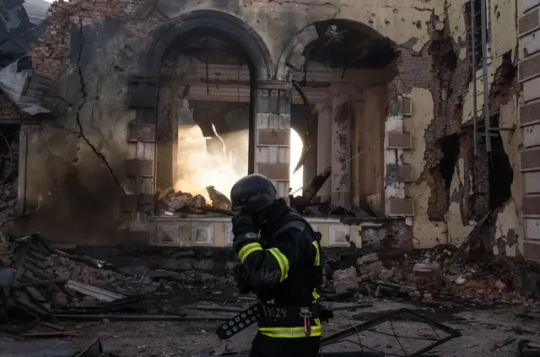
Firefighters battle a blaze caused by a Russian strike on the train station in Kostiantynivka. February 25, 2024.
Hector Adolfo Quintanar Perez / ZUMA Press Wire / Scanpix / LETA
After Russian President Vladimir Putin sent troops into Ukraine in a full-scale invasion in February 2022, more than 1.2 million people, or two-thirds of the population, fled their homes in the Ukrainian-controlled areas of the Donetsk region. Those who remained in wartorn Donbas were often the elderly, sick, or those with nowhere else to go — like Nadiya and her four children.
Nadiya is separated from her husband, who she says had a drinking problem. He moved to Poland to look for work before Russia’s February 2022 invasion, leaving Nadiya to raise their three daughters on her own. When the full-scale war began, Nadiya and her children were living on the outskirts of Kostiantynivka near Bakhmut, a city that would soon see one of the longest and bloodiest battles of the war.
Nadiya describes the early days of the full-scale invasion as “gray and scary.” “They weren’t giving out humanitarian aid yet, and people were panicking. Everyone was buying up food. Some people were leaving, others were arriving. It was hard,” she recalls.
As the war raged on, Nadiya found herself in a new relationship and became pregnant with her fourth child. “When I found out that I was pregnant, I had a lot of [different] thoughts on the matter. Naturally, I was afraid of what would happen next. All the gynecologists had left the city,” Nadiya explains as she holds her baby. “But having thought about everything and weighed it, I decided that if this happened, then, apparently, it was all for a reason,” she adds.
Nadiya’s street came under direct shelling shortly after she was discharged from the maternity ward. “My whole life flashed before my eyes,” she says. “After that, we decided we couldn’t continue like this because the children weren’t sleeping at night.” The mother decided to move her family to the small house where they live now, which belongs to her grandmother. The situation in this part of Kostiantynivka “has more or less stabilized,” she says, and her children are no longer too scared to sleep. But Nadiya struggles to support her family financially.
Since she and her husband never divorced, she isn’t eligible for government assistance for single mothers. And her new partner is currently in the hospital following an accident that left him with a permanent disability. She herself is unable to work, given the number of children in her care, and so her family lives in extreme poverty. According to Nadiya, her main source of income is the 860 hryvnias ($22) in social assistance she receives each month as the mother of a newborn.
The war has left 2.92 million Ukrainian children in urgent need of assistance, according to UNICEF. An estimated 493,000 children are living along the 1,000-kilometer (620-mile) frontline that runs through the south and east and in occupied areas of Ukraine, where they constantly face “intense shelling, damaged housing infrastructure, and severe constraints to their basic needs.” A UNICEF survey also found that 41 percent of mothers in frontline communities feel unsafe in their current locations.
UNICEF reports that the war has caused a “poverty shift” in Ukraine, with relatively well-off households suddenly falling below the poverty line and groups considered “traditionally vulnerable” (such as families with three or more children, children under the age of three, and single parents) falling under the extreme poverty line. A UNICEF survey of 9,000 Ukrainian mothers found that 59 percent reported receiving no social assistance for their children, while 57 percent said financial assistance is their most critical need.
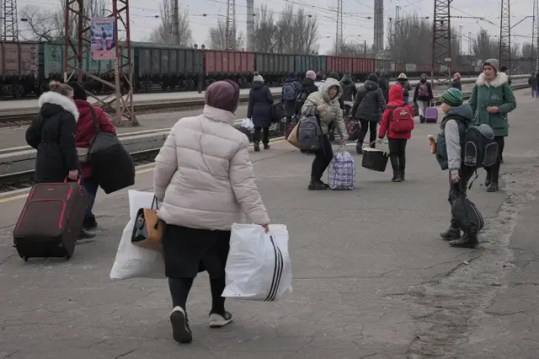
People wait for a Kyiv-bound train on the platform in Kostiantynivka. February 24, 2022.
Vadim Ghirda / AP / Scanpix / LETA
Nadiya says international organizations, including the Norwegian Refugee Council and UNICEF, have supported her family on several occasions. “Of course, it helps a lot. But the money runs out very quickly.”
Lack of funds has also made it impossible for Nadiya to relocate her family to a relatively safer part of Ukraine. Nadiya says she started to inquire about moving to Odesa after her fourth child was born, but multiple realtors told her variations of the same thing: “You guys are crazy. Who will let you rent an apartment with four children? It’s just suicide. Four children means a destroyed apartment in a month.”
‘I don’t know where there’s a safe place’
At the local recreation center, children run around laughing with one another, but explosions can be heard drawing nearer outside of the building. The parents and children carry on with their day as if nothing has happened because they are used to the sounds of attacks.
Olena, 35, is the mother of two boys aged six and ten. The family remained in Kostiantynivka throughout the full-scale war. But Olena says she was much more optimistic about the future before Avdiivka fell to Russian forces. Located 70 kilometers (43 miles) from Kostiantynivka, Avdiivka was the epicenter of the war for months. Ukrainian Commander-in-Chief Oleksandr Syrskyi announced that Ukrainian troops had pulled out of the city on February 17, marking the first significant win for Russia since its forces captured Bakhmut last spring. “We were in shock, and [now] we don’t know what to do next,” Olena says.
As she talks about life in Kostiantynivka, Olena begins to cry. She and her husband were forced to leave their home in Donetsk in 2014 after the city fell under Russian occupation, and they have lived in Kostiantynivka for 10 years. “I’m crying because I understand that [the frontline is getting] closer and closer, and I have to move. But where? I don’t know,” Olena says.
Olena has taken in an array of animals during the war, ranging from geese to dogs, many of which had been abandoned by families who fled the city. She refuses to leave behind all of her pets but acknowledges that it would be difficult to find a new home with them in tow. At the same time, Olena says everywhere she could move in Ukraine would also be dangerous. She has relatives in a small village outside of Uman, in central Ukraine, but according to Olena, people there are less than welcoming to displaced compatriots. “They didn’t say not [to] come, but I understand they don’t want us there,” she explains.
“I know many cases when people moved and [then] they were bombed, or their houses were destroyed. They were stressed, and they came home again,” she adds. “I don’t know where there’s a safe place.”
Olena also worries that if her family were to leave Kostiantynivka, her children might have to go to school in person, where they could be targeted in a Russian attack. (According to Ukraine’s education minister, more than 3,900 educational facilities have been damaged or destroyed during the full-scale war.) “As a mom, I’m afraid for my children,” Olena says. “I understand that [if] we move from Kostiantynivka and live in a ‘normal’ city, I’ll be afraid of what [might] happen when my children go to school. Online education is the better way for me.”
Another mother named Halyna, 38, sits on a black couch, speaking about her three children. “You begin to see all of this [motherhood] differently. All of your goals, your perception of time, and your use of it,” she says when asked what it’s like to be a mother in wartime.
A single parent who works as a corporate lawyer, Halyna has kept her family in Kostiantynivka throughout the war. “I didn’t go abroad because I understood perfectly that I couldn’t practice my profession there,” she explains. “I have friends in Germany, but I didn’t want to work as a cleaner. I’m not ready to live like many people, just receiving benefits; it’s against my life principles.”
Halyna says she would leave if her children were afraid. Still, she says she believes there’s a “very high risk” that Kostiantynivka will be occupied soon. In that case, she and her family will “definitely” leave. They have already packed their bags: “My whole life is [in] there, absolutely everything. There are personal belongings, dishes — everything that has some value to me.”
Halyna says her family would most likely move to Dnipro, a city 240 kilometers (143 miles) west. She could continue working remotely from there. “Responsibility is the most difficult thing,” she reflects. “Not just the sense of responsibility for yourself but for [your children’s] lives and health, and making the right choice.”
‘A worthy example’
Responsibility is a topic that all parents in Ukraine have to grapple with in wartime. They must decide when to stay put and when to leave everything behind, taking away what little sense of routine and security their children still have.
In the most extreme cases, however, the Ukrainian authorities are the ones making that call. The Cabinet of Ministers approved a mechanism for the mandatory evacuation of children from active combat zones in March 2023. At the time, the only area that met the criteria for forced evacuations was Bakhmut, but the authorities have since called for families with children to evacuate from other frontline settlements, like those in the Kharkiv region’s Kupyansk district.
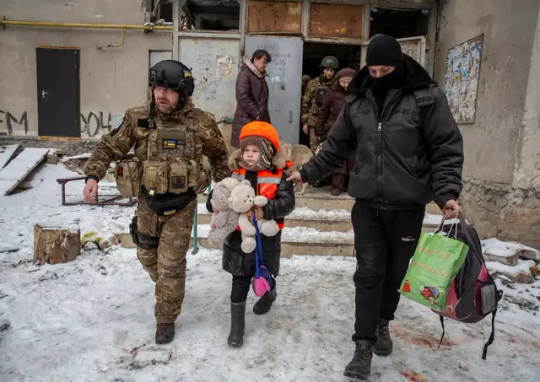
Ukrainian officers prepare a child wearing a ballistic vest for evacuation from Bakhmut. March 31, 2023.
Oleksandr Ratushniak / Reuters / Scanpix / LETA
According to Shelly Whitman, the executive director of the Dallaire Institute for Children, Peace, and Security, there is a dearth of international guidelines on how governments — not to mention parents themselves — should handle evacuations of children in such scenarios.
“In essence, the Ukrainians are having to make up [criteria] on their own at the moment,” she told The Beet. “There are no clear guidelines in any of the international child protection laws.” As Whitman pointed out, decisions on evacuations are complex: Telling civilians to flee an active combat zone is one thing, but whether they have the resources to leave, a safe route out, and a place to go are all separate questions.
On March 18, local authorities reported that all families with children had been evacuated from Chasiv Yar, a town just 20 kilometers (12.4 miles) from Kostiantynivka. But they have yet to carry out evacuations in Kostiantynivka itself. When a mandatory evacuation order is announced, parents or guardians do not have the right to refuse; they must accompany their children or entrust another relative to do so. Refusal to evacuate a child can be deemed a misdemeanor, punishable by a fine, or a criminal offense, punishable by up to five years in prison, according to the aid group Donbas SOS.
Back at Nadiya’s house, her eldest daughter takes the baby, who is still crying. At just 12, she helps her mother care for her younger siblings and with everyday tasks like cooking. But she still has schoolwork to do and is struggling with online classes. “Half of her school friends are [still] here because most people are unable to leave,” Nadiya says, explaining that the children sometimes “meet up” virtually.
With Kostiantynivka still under fire regularly, Nadiya says her family “operates according to the rule of two walls,” hiding in the corridor to avoid windows that could shatter from shock waves. The nearest basement where they could shelter in case of nearby shelling is located outside the house, under a summer kitchen, so “you still need to run to it,” Nadiya explains. “Everything is scary here right now,” she says. “It is impossible to get used to this, but somehow we already [did].”
Well aware of the dangers of staying, Nadiya admits that her family is “preparing for the worst” and bracing for the possibility of having no choice but to evacuate. “We will stay until the last moment, for as long as we can. Then, of course, we won’t put the children at risk. We’ll see if we have to leave. Of course, it’s scary. We are very afraid.”
For now, Nadiya hopes for peace to come as soon as possible and for “people around the world to learn how to forgive each other and resolve conflicts peacefully.” Until then, she tries to instill strength in her children every day. “I understand that I need to live for them,” she says. “I need to be strong for them. And even if there’s a weak spot, I need to hide it somewhere inside myself, so that the children understand that I am a worthy example.”
3 notes
·
View notes